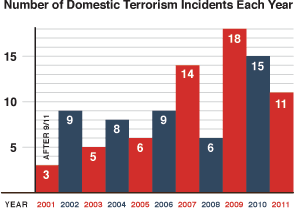
|
A non-partisan non-profit organization working to make criminal justice and public safety policies and practices more effective through innovation, research, and education. |
 INITIATIVE
INITIATIVE
Domestic Terrorism Post-9/11 (2001-2011) During the ten years following September 11th, 2001 there were over 100 incidents of "home-grown" or domestic terrorism in the United States. To provide a valuable resource on this topic, the Crime Commission has compiled an extensive database of incidents including attacks, plots, support for, membership in, or connections with a terrorist organization. While information about terrorist incidents are available elsewhere, both on and off the Internet, the Crime Commission's database is unique in providing a centralized, concise, user-friendly, and visually engaging informational resource on domestic terrorism. As FBI Director Robert Mueller has observed, the rise of "home-grown" terrorism is one of the most alarming developments of the ever-evolving terrorist threat. "Today's threat," Director Mueller explained in a speech at the Crime Commission's Speaker Series, "is just as likely to come from our own streets as it is from people who are sent from overseas." Domestic terrorism can emerge from an indirect link to overseas terrorist groups like Al Qaeda and Al Shabaab, or simply an affinity for extremist ideologies or militant organizations. The ability of jihadists to spread their messages through global media provides a vehicle for individuals to "self-recruit" or become "self-radicalized"--often by reading or watching online materials. Once an individual has become radicalized, Director Mueller explains, "we see them recruiting their friends and forming cells that answer not to a particular leader, but to an ideology." This growing independence from any centralized authority presents one of the most challenging aspects of "home-grown" terrorism. "Before September 11," Director Mueller has said, "a recruit would go through months of training in a camp in Afghanistan... Now what we see is a new threat: decentralized and more diffuse." This threat is characterized, Director Mueller explains, by "smaller, more loosely-defined individuals and cells who are not affiliated with Al Qaeda, but who are inspired by a violent jihadist message." While many "home-grown" terrorists are focused on attacks in the United States, others look to take action in other countries. In a number of cases, young people from the United States--including citizens--have become inspired or even recruited to participate in extremist movements in places like Afghanistan, Iraq, Yemen or Somalia. Some participated as fighters, or at least attempted to volunteer, while in one extreme case, an American acted as a suicide bomber. The myriad threats presented by "home-grown" terrorism will need to be closely monitored by law enforcement, counter-terrorism organizations, and the American public as a whole. The Crime Commission hopes this database will serve as a useful resource and provide valuable perspective on domestic terrorism in the post-September 11th world.
About the Database Incidents were selected for inclusion based on the following criteria:
|